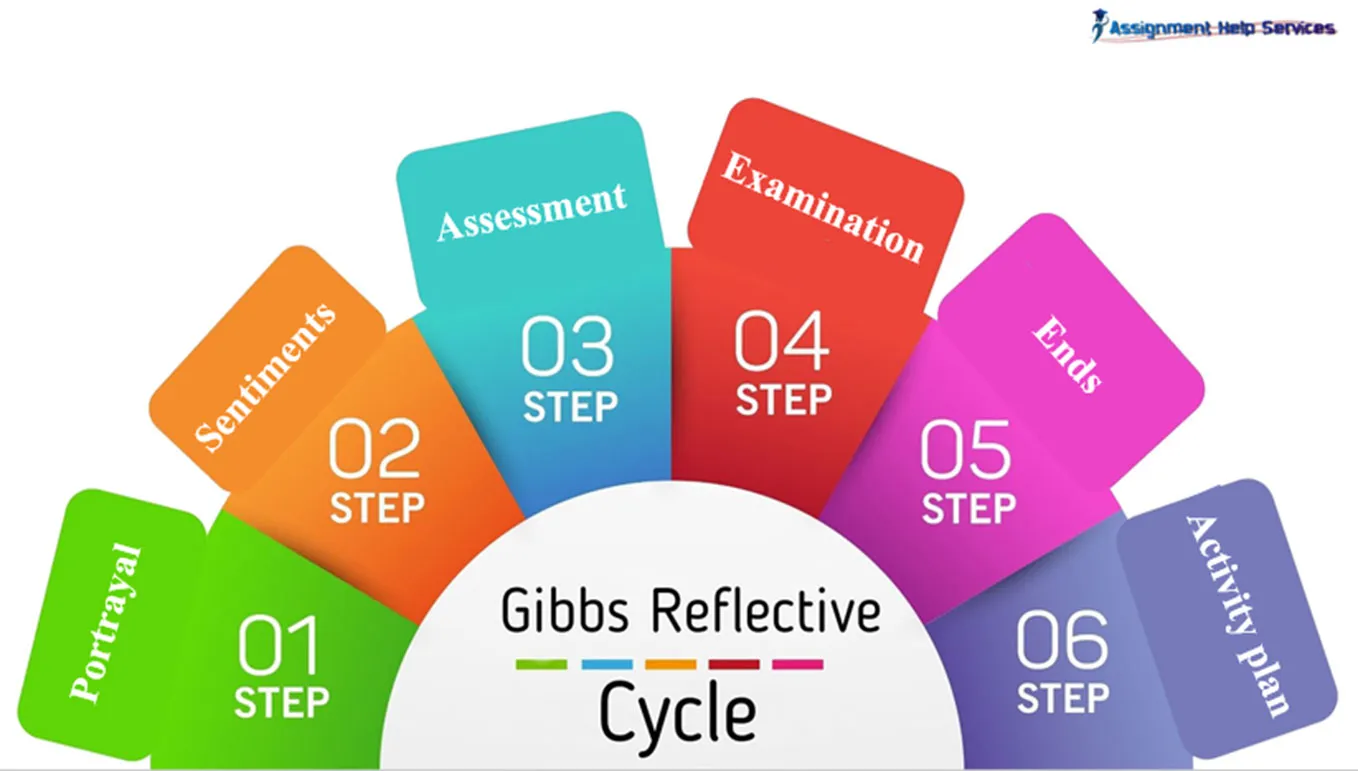Gibbs Reflective Cycle
Introduction to Gibbs Reflective Cycle
The Gibbs Reflective Cycle is a framework used to help individuals reflect on and learn from their experiences. It is widely used in education, healthcare, and other fields where reflection and learning are important. The cycle consists of six stages:
- Portrayal of the experience
- Sentiments and considerations about the experience
- Assessment of the experience, both great and awful
- Examination to figure out the circumstance
- Decision about what you realized and what you might have done any other way
- Activity plan for how you would manage comparative circumstances later on, or general changes you could view as proper

Let’s explain each stage in detail
- Portrayal- Here, you get an opportunity to portray what is going on exhaustively. The central matters to incorporate here concern what occurred. Your sentiments and ends will come later. Supportive inquiries:
- What was the deal?
- When and where did it occur?
- Who was available?
- Sentiments- Here, you can investigate any sentiments or considerations that you had during the experience and what they might have meant for the experience. Accommodating inquiries:
- What were you feeling during going on?
- What did you feel when the circumstance?
- What do you suppose others were feeling about the circumstance?
- Assessment- Here, you get an opportunity to assess what worked and what didn't work in the circumstance. Attempt to be as goal and genuine as could be expected. To take advantage of your appearance centre around both the positive and the negative parts of the circumstance, regardless of whether it was fundamentally either. Supportive inquiries:
- Why was the experience great and awful?
- What worked out in a good way?
- What went poorly?
- Examination- The examination step is the place where you get an opportunity to sort out what occurred. As of not long ago, you have zeroed in on subtleties around what occurred in the circumstance. Presently you get an opportunity to remove importance from it. It would help if you focused on the perspectives that worked positively or ineffectively and wondered why. On the off chance that you are hoping to incorporate scholarly writing, this is the usual spot to incorporate it. Supportive inquiries:
- For what reason did things work out in a good way?
- For what reason didn't it work out positively?
- What sense would I be able to think about the circumstance?
- Ends- In this segment, you can make decisions about what occurred. This is the place where you sum up your learning and feature what changes to your activities could work on the result from now on. It should be a characteristic reaction to the past segments. Accommodating inquiries:
- What did I gain from the present circumstance?
- How is it that this could have been a more certain circumstance for all interested parties?
- Activity plan-At this progression, you plan for what you would do any other way in a comparable or related circumstance later on. It can likewise be beneficial to contemplate how you will unexpectedly take action - with the end goal that you don't just arrange what you will do any other way, yet in addition to how you will ensure it occurs. Sometimes the acknowledgment is sufficient, yet different time updates may be useful. Accommodating inquiries:
- Assuming I needed to rehash the same thing, what might I do another way?
- How might I foster the expected abilities I want?
Conclusion
Overall, the Gibbs Reflective Cycle is a valuable tool for promoting reflection and learning from experiences and can be applied in various settings and contexts. It offers a system for looking at encounters and, given its cyclic nature, loans itself exceptionally well to rehash encounters, permitting you to gain and plan from things that either worked out in a good way or went poorly. Depending on the context you are doing the reflection, you should use different levels of detail.




